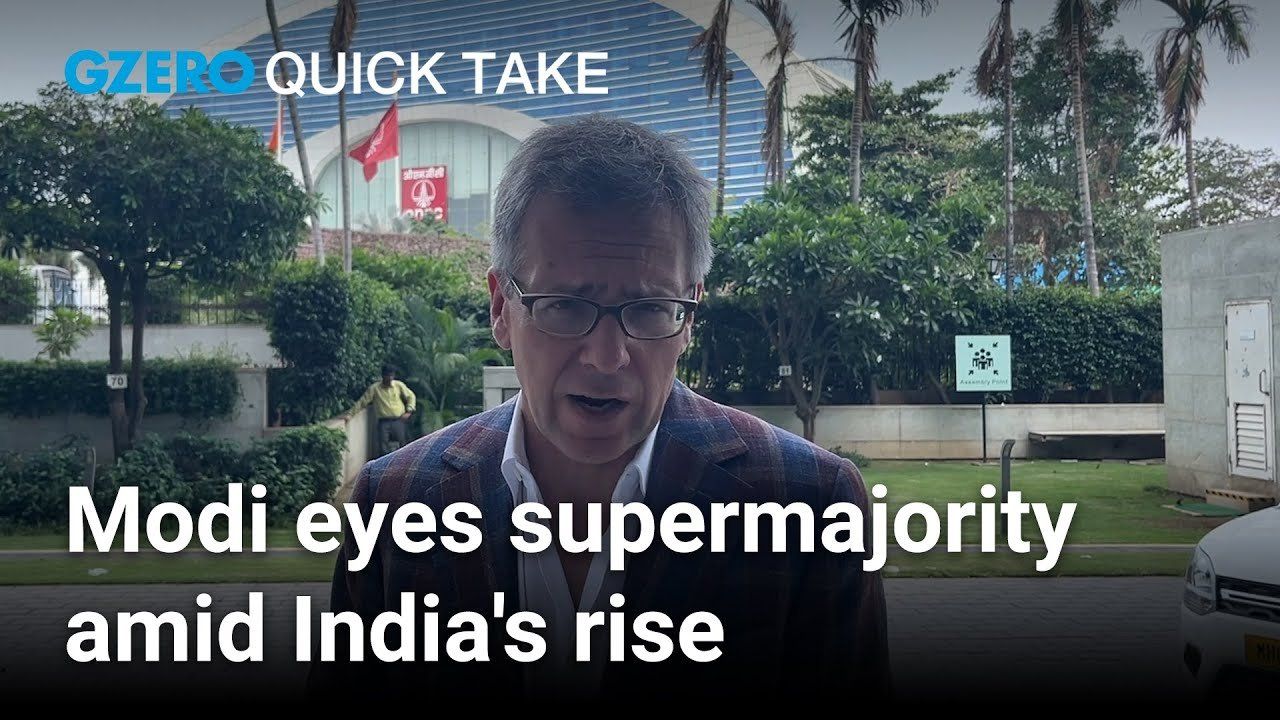Quick Take
Modi set to win big in India's elections as economy booms

Modi clear favorite in India elections, but not close to supermajority | Ian Bremmer | Quick Take

Ian Bremmer's Quick Take: Hi, everybody. Ian Bremmer here wrapping up my week in Mumbai, India.
And a lot is going on. But I'll give you a Quick Take given that it is the middle of the election season. So that is what everyone is talking about. Prime Minister Modi, coming out publicly saying that he thinks he's going to get over 400 seats, which would be a supermajority. That'd be incredible. It's also not going to happen, saying that to get people excited. In reality, it's going to be a lot closer. But it does look pretty clear that he is going to win. And that he is going to have roughly the number of seats he had last time around. Why? Because he is one of the most popular leaders in any major democracy in the world today, consistently 60-65% approval ratings.
Think about Europeans or Americans or Japanese or Latin Americans and how they would feel about those approval ratings. Why? Well, in part because India's growing, because the economy is at a sort of significant cliff. And they're investing in infrastructure, literacy rates are improving. Globalization is happening. It's still a very poor country. It's a poor country that is getting wealthier. And since the last time here, you can definitely see it. A lot of the new bridges and tunnels that are being built and buildings that are coming up, and also systems and services that are better. You know, I'm not seeing the same level of rolling blackouts, for example, or data outages that you saw before. And the people that are running corporations tell me that they don't need the same level of redundancy, (well, they still need redundancy), than they did 5 or 10 years ago. Quality of manufacturing is going up. More people are able to build things that really matter for global production, both in terms of componentry, also in terms of even in some cases, finished products like automotive and motorcycles. So it is an exciting story at home here in India.
It's also an exciting story internationally because India, of course, is one of the few countries that is trying to build a global model of leadership itself that isn't seen as at the expense of other countries. It's not really an India-first foreign policy. It's more India that wants to be seen as a leader of the Global South, but also a bridge with the major advanced industrial democracies assertively trying to act like a friend to the rest of the world, though there are exceptions there.
One exception is Canada, where you saw the assassination of a Canadian citizen, Sikh, who was involved in supposedly terrorism. But this caused a big flap between those two countries. Still hasn't been patched over. Not the strategically most important relationship, but not something you want to see. Also, right here in India, the immediate backdrop is kind of problematic. The China relationship is a little more stable, kind of reopening, you know, sort of getting some visas going and getting some flights moving. But still, it is a relationship with a contested border and not a lot of foreign direct investment, a fair amount of hostility still between these countries. Pakistan, also border challenging. Myanmar border, you've got a potential coup that's going on really challenging. So if you're India in your immediate environment, you know, actually feels very, very other than stable, it feels pretty hostile.
It feels like a part of the world that you need to spend a lot more money on defense. You need to build up your capabilities. It's one of the reasons why the relationship with the United States has improved. It's one of the reasons the Indians are looking to be a part of the Quad, trying to be a part of the new US-led regional architecture that is popping up in Asia.
But at the end of the day, if India is successful, they have to work with pretty much everybody. And that is something that I think motivates and excites a lot of Indians going into the polls for the last few weeks and going forward.
That's it for me and I'll talk to you all when I get back to States.
Ian Bremmer sits down with former US Ambassador to NATO Ivo Daalder to unpack a historic shift in the transatlantic alliance: Europe is preparing to defend itself without its American safety net.
Think you know what's going on around the world? Here's your chance to prove it.
Argentina, Armenia, Belarus, Egypt, Indonesia, Jordan, Pakistan, Paraguay, Vietnam – to name only a few.
A poster featuring Andrew Mountbatten-Windsor, formerly known as Prince Andrew, is installed on a sign leading to the parking area of the Sandringham Estate in Wolferton, as pressure builds on him to give evidence after the U.S. Justice Department released more records tied to the late financier and convicted sex offender Jeffrey Epstein, in Norfolk, Britain, February 5, 2026.
British police arrested former Prince Andrew Mountbatten-Windsor today over allegations that in 2010, when he was a UK trade envoy, he shared confidential government documents with convicted sex offender Jeffrey Epstein.